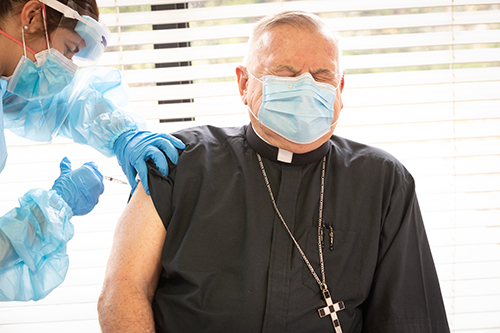By Archbishop Thomas Wenski - The Archdiocese of Miami
I never was a big fan of needles and injections; and, even if I winced, I was happy to be among the first to submit my arm for an injection of the first dose of the Pfizer-BioNTech COVID-19 vaccine. The injection was no worse than my annual flu shot and not as uncomfortable as the times a nurse pokes my arm looking for a vein from which to draw blood.
Florida public health officials administered the vaccine Dec. 16, 2020 at St. John’s Nursing Center, located near Fort Lauderdale on the north campus of Catholic Health Services of the Archdiocese of Miami. I was one of some 120 staff and 82 patients to be vaccinated just days after the vaccine was approved for distribution. (We received the second dose three weeks later, Jan. 6, 2021.) Nursing home residents and health care providers are in Florida’s “tier one” group for the vaccine’s rollout.

Photographer: TOM TRACY | FC
Archbishop Thomas Wenski winces as he receives a dose of the COVID-19 vaccine when Florida state public health officials rolled it out Dec. 16, 2020 at St. John's Nursing Center in Fort Lauderdale, part of Catholic Health Services of the Archdiocese of Miami. Staff and residents of the facility were offered the Pfizer-BioNTech COVID-19 vaccine, which the U.S. Food and Drug Administration authorized for emergency use Dec. 11, 2020.
Catholic Health Services of the Archdiocese of Miami operates 38 facilities in Broward and Miami-Dade counties. With several thousand frontline workers and some 5,000 residents in archdiocesan nursing homes, rehabilitation hospitals, assisted living facilities, and elderly housing, I wanted to set an example and encourage our staff and program residents to take the COVID-19 vaccine. (I have also recorded a Creole language video urging our Haitian frontline workers to be vaccinated.)
While health care workers and those in nursing homes and long-term care facilities are first in line to get immunized, we also operate a large Catholic school system; and we would want our schools’ staff and faculty as well as our priests and parish staffs, and those we serve through our Catholic Charities programs, to step up and be immunized when the vaccine becomes available to them.
Because of fears or misgivings that some people may have, I wanted to demonstrate confidence in the vaccine that was approved and authorized by the U.S. Food and Drug Administration, and to underscore that as Catholics we have no ethical concerns about the vaccine.
The moral concerns raised by some about the Pfizer and Moderna vaccines’ connection to cell lines that originated with tissue taken from abortions in the 1970s have been addressed by the United States Conference of Catholic Bishops. Bishop Kevin Rhodes (Fort Wayne-South Bend), chair of the doctrine committee, and Archbishop Joseph Naumann (Kansas City, Kansas), chair of the committee on Pro-Life Activities, wrote that any connection to morally compromised cell lines is remote and therefore there is no objection to the use of these vaccines. The public health situation is simply too grave to reject the vaccines. Being vaccinated is a morally responsible way of loving one’s neighbor and advancing the common good. Vaccinating as large a proportion of the population as possible is the best way forward in taming this virus.
Catholic Health Services of the Archdiocese of Miami has had a very strong infection control program which did allow a safe means for family and loved ones to visit with relatives who reside at CHS elderly housing. However, this has required extraordinary effort and expense. Those who contracted COVID were separated from the general population and placed in an isolation area. Over 30,000 COVID tests were given for both patients and staff. Staff has been tested 15 times over, and each of our residents has been tested 16 times over the last nine months. At the same time, some 135,000 people were screened when they came into one of our facilities. It would be an understatement to say that “Operation Warp Speed” has been welcomed by us.
This vaccination effort is a public good and is an acceptable way for Catholics and others to help combat the ever expanding COVID-10 pandemic. As we have learned before, other types of vaccines have done great things in protecting us from various diseases over the years. I am encouraging participation by everyone, because even people who might not have much to fear from infection — if they are not high risk and if they are healthy or if their demographic is such that they would expect to recover easily — the fact that they would get vaccinated will be a benefit to others around them because by being vaccinated they would not be responsible for others catching the virus.
Hopefully my stepping up will motivate other people to get the vaccine as it becomes available to them, so that soon we can get on the far side of this pandemic. In the meantime, even with the vaccine, I will continue — as per CDC guidelines — to mask up, practice social distancing, and wash my hands frequently.
This column was originally published Dec. 21, 2020, in the online edition of America magazine.

